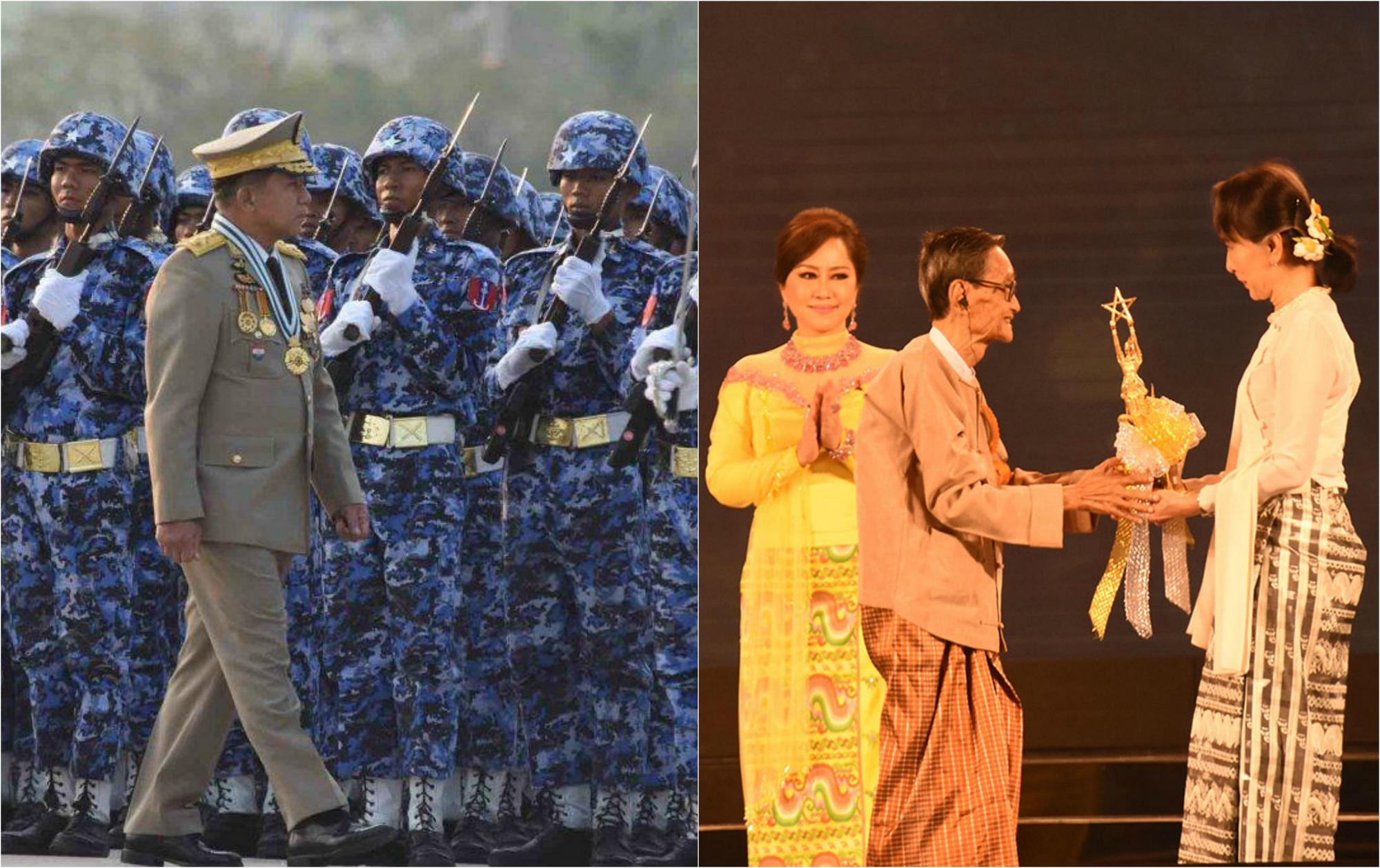Despite often being presented as opposing forces in the struggle over control of Myanmar, speeches given by Commander-in-Chief Min Aung Hlaing and State Counsellor Aung San Suu Kyi in the past couple of weeks reveal that the two may have more in common than many think.
Though the context of their respective speeches differed – hers delivered to an adoring audience of celebrities and filmmakers at Myanmar’s 2018 Academy Awards and his delivered to stoic rows of military personnel gathered for Armed Forces Day – the themes and even the words they chose to use were eerily similar.
Consider the passage below. Did Aung San Suu Kyi say this? Or was it Min Aung Hlaing?
“In this era, people always talk about human rights, but they don’t talk much about responsibilities. This is the context of the world. If we can achieve a unique thing and balance human rights with responsibilities, then we will be better than all the other countries.”
What about this?
“In a democratic system, even though there is freedom of speech and freedom of the press, it is also important that people take responsibility to speak and publish in a disciplined manner.”
The first quote was from the state counsellor; the second was from the commander-in-chief. Both call on the public to sacrifice their rights for the good of the country.
In addition to warning the public against leveraging their rights in ways they do not approve of, both Aung San Suu Kyi and Min Aung Hlaing flavored their speeches with heavy doses of nationalism. Many have reacted negatively to the general’s speech for it’s anti-Rohingya sentiments, but little has been written on the general sense of nationalism and victimhood that pervades the rest of his speech – themes that Aung San Suu Kyi’s speech also taps into.
Both leaders spoke of the need for Myanmar people to be able to defend themselves and stressed the need for the people of Myanmar to work together to improve themselves in order to be better able to defend the nation. Min Aung Hlaing said: “We need to have a military that can attack back if we are attacked…We must work to make sure our military is one that is modern and up to the standards of other militaries around the world.”
This is a sentiment that differs in content but not in spirit from Aung San Suu Kyi’s pronouncement that “Our country cannot be like other countries. We have to be more refined than other countries. No matter how much they harass us or attack us, our response has to be refined, correct, and respectful. Creative artists play an extremely important role in this…We all know how successful the entertainment industries in some Western countries are. We can also be this successful. We have many opportunities to use the entertainment industry as a step to make the world know, understand, and respect our cultures and our desires.”
Both leaders also heavily stressed the importance of fulfilling one’s personal duty to the state. This duty, argued the general, is what the Tamadaw is all about. His speech celebrates the role the Tamadaw has played from independence to today by laying “the foundations that made a democratic government possible today,” while ensuring that troops fulfilled their “responsibility to protect Myanmar.” Well-documented human rights abuses that made Myanmar’s ruling junta infamous were not mentioned.
Film industry professionals play a similar role, according to the state counsellor’s speech. Aung San Suu Kyi recognized the influence and impact of film, telling the crowd at the Academy Awards: “I want the countrymen and women of the filmmaking world to think about how they can help increase Myanmar’s soft power throughout the world…I want you to try hard not because you think of this as a business but because you think of this as something for your country.”
The woman once hailed as a beacon of democracy has, while acting as the de facto leader of Myanmar, has publicly called on professional filmmakers to produce state propaganda.
In the space of a week, both Min Aung Hlaing and Aung San Suu Kyi used their platforms to enlist the public in rehabilitating Myanmar’s image without recognizing their own roles in damaging that image in the first place. Perhaps the two leaders are not so much opposing forces so much as they are the two sides of the same coin.





Reader Interactions